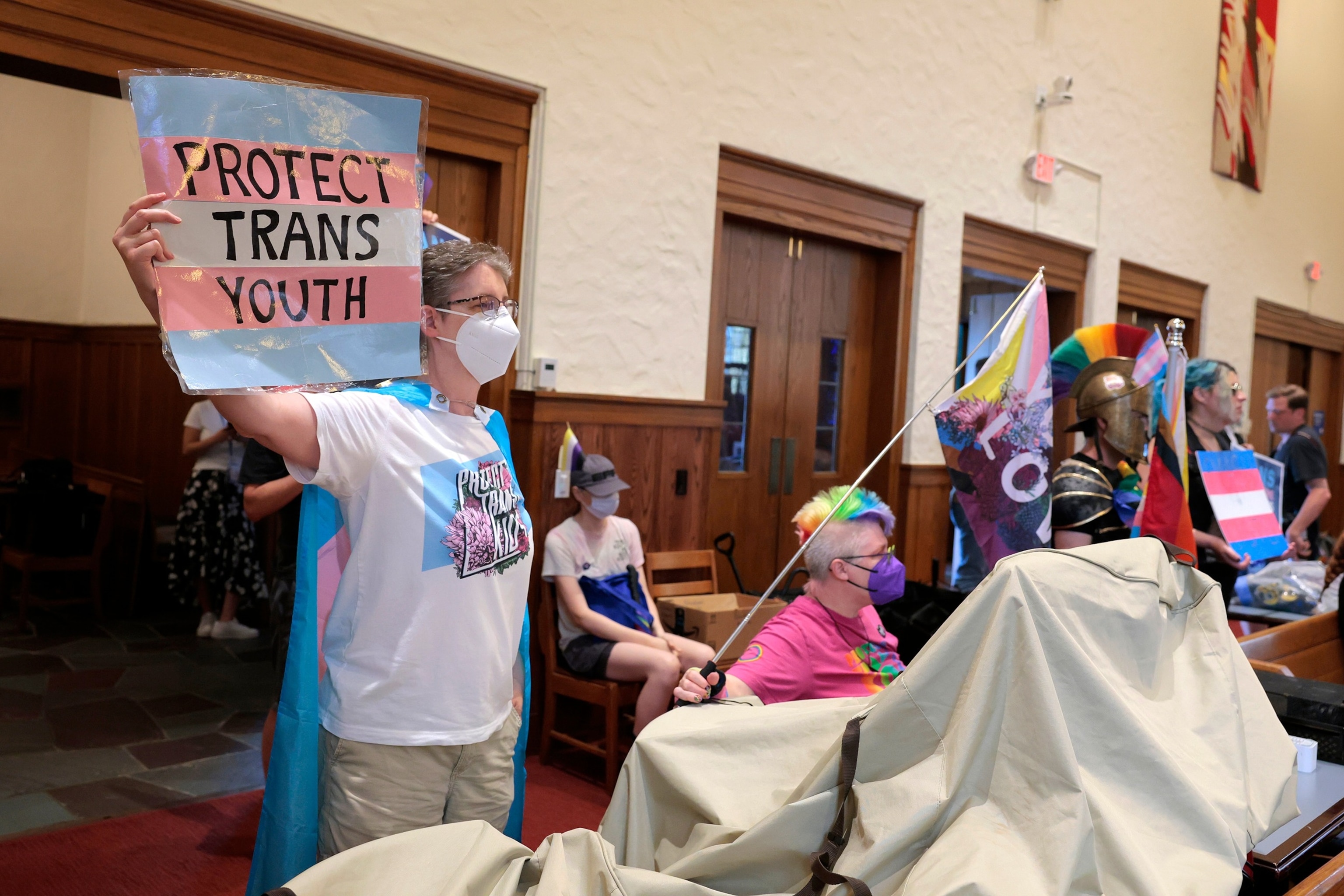More US hospitals end gender-affirming care for minors. How this may impact patients

Two U.S. hospitals are the latest to announce they will be ending some, or all, of their pediatric gender-affirming care services at the end of the month.
Kaiser Permanente, a health care company that manages 40 hospitals across several states -- including California, Oregon and Virginia -- said it is pausing gender-related surgeries for patients under age 18 on Aug. 29. It noted that other gender-related care will continue.
Children's National Hospital in Washington, D.C. said it will also stop prescribing gender-affirming medications on Aug. 30. It follows a move the hospital made in late January to pause all puberty-blockers and hormone prescriptions for minors.
Since President Donald Trump's second term began in January, at least 17 major hospital systems in at least nine states and the District of Columbia have paused, discontinued, canceled or ended pediatric gender services, according to an ABC News tally, amid mounting legal and regulatory concerns.
In January, Trump signed an executive order stating the U.S. would not "fund, sponsor, promote, assist, or support" gender transition of those under age 19 and would "rigorously enforce all laws that prohibit or limit these destructive and life-altering procedures."
Transgender adults and youth may experience extreme psychological distress due to a mismatch in their gender presentation and identity. They experience significantly higher rates of suicide than the general population, but some studies suggest gender-affirming care eases those feelings of distress.
While some individuals and groups have called for a slower approach to gender-affirming care for minors, other pediatric gender care experts and advocates have said ending such care can have a harmful effect on patients' mental health and well-being.

They say the government is interfering in conversations meant to be held only between patients, their families and doctors, and that doctors are not being allowed to follow the established medical guidelines that medical associations like the American Academy of Pediatrics, the Endocrine Society and the World Professional Association for Transgender Health have endorsed.
"This is health care provided by licensed clinicians according to standards of care that have been around for many years," Kellan Baker, a senior adviser for health policy with the Movement Advancement Project, a nonprofit think tank that focuses on LGBTQ+ issues, told ABC News.
"To have the government interfering … overreaching into the private conversations between patients and families and their doctors and telling doctors that they cannot provide the care that they know that their patients need -- that is a very serious government overreach," he added.
Evidence for gender-affirming careGender-affirming care may include medical, surgical, mental health and non-medical services. It can range from allowing a child to pick their pronouns to more invasive treatments typically prescribed for older teens.
Early gender affirming care can be "crucial" to overall health and well-being, allowing a child to focus on social transitions and can help build up confidence while dealing with the health care system, the federal Office of the Assistant Secretary for Health wrote during the Biden administration.
Gender-affirming care is supported by multiple major medical organizations. Studies have shown many of the treatment options are generally safe and that care can have a positive impact on mental health, which psychotherapy alone cannot provide, some experts said.
Some experts have questioned the significance of the interventions on long-term mental health as well as the possibility of regret and point out potential risks on future fertility.
"It's deeply disappointing that hospital systems have relented to the political pressure, not scientific pressure, to end these sorts of programs," Dr. Marci Bowers, a gynecologic and reconstructive surgeon at Mills-Peninsula Medical Cener in Burlingame, California, told ABC News. "We have decades of evidence-based information that suggests that gender-related health care is beneficial to patients and their families with very, very, very scant incidences of regret or disappointment in that care."
A spokesperson for Children's National Hospital told ABC News it was discontinuing the prescription of gender-affirming medications in light of "escalating legal and regulatory risks" to the hospital, its providers and families.
"We know this change will have a significant impact on affected patients, families and staff, and our care teams are working directly with families of current patients to support them," the statement read, in part. "Mental health and other support services for patients remain available. LGBT patients are always welcome at Children's National for other medical needs and treatment."
Similarly, a spokesperson for Kaiser Permanente pointed ABC News to actions from the administration, including the Department of Justice issuing subpoenas to doctors and clinics providing gender-affirming care to transgender youth.
"As the legal and regulatory environment for gender-affirming care continues to evolve, we must carefully consider the significant risks being created for health systems, clinicians, and patients under the age of 19 seeking this care," the statement read, in part. "After significant deliberation and consultation with internal and external experts, including our physicians, we've made the difficult decision to pause surgical treatment for patients under the age of 19 in our hospitals and surgical centers."

The hospital said it would work to identify clinicians performing surgery if a patient's planned operation was canceled and, if a clinician is available, the hospital said it will work with patients and their families to coordinate care and provide coverage for surgical treatment.
Bowers -- the Mills-Peninsula gynecologic and reconstructive surgeon -- said if somebody is in treatment and that treatment is suddenly withdrawn, it can be extremely difficult, and patients can experience psychosocial and personal setbacks. She said treatment gave patients a psychological boost.
'When you look and you talk to these individuals, they are happier about themselves," she said. "They're happier about their bodies. They're happier about their choice of friends, how they see themselves in the world. They're more optimistic. So those are softer measures, but they're important, and those things matter."
She also said withdrawing medical care can be a major disruption to patients' lives because families may have to move to receive care that is now no longer being provided locally.
Baker -- the Movement Advancement Project's health policy adviser -- said he sees the actions from the administration as a "campaign of terror" against health care institutions, doctors and families, and that decisions about continuing or discontinuing gender-affirming care should remain between patients and their health care providers.
"This is about health care providers working together with patients and parents to get kids what they need," Baker said. "It's nothing more. It's nothing less. All that trans people are trying to do is live their lives, and all the parents of trans kids are trying to do is love their kids."

Not all experts are opposed to the closures. Dr. Kristopher Kaliebe, a child and adolescent psychiatrist and professor at the University of South Florida Morsani College of Medicine, believes the retrenchment reflects long-standing scientific concerns.
"Clinicians have quietly recognized for years that the evidence base for these interventions in minors is weak," he told ABC News. "There's no strong proof that they improve mental health, and we simply don't know the long-term outcomes."
In May, the Department of Health and Human Services (HHS) released what it called a "comprehensive review" of transgender care for children and teens, calling for broader use of psychotherapy for young people with gender dysphoria rather than gender-affirming care.
The authors of the review were not named, so their credentials have not been reviewed and the paper has not yet been peer-reviewed by independent scientists yet -- a step this is typically necessary before changing any guidelines that health care providers follow.
The more than 400-page document details possible harm from medical interventions for youth, including the use of puberty blockers and potentially associated risks, such as infertility.
It follows systematic reviews from Sweden, Finland and the U.K. that have resulted in the three countries restricting gender-affirming care. England’s National Health Service ended prescribing puberty blockers for minors experiencing gender dysphoria outside of clinical trials. Sweden and Finland have followed psychotherapy-first models.
Kaliebe called the HHS review a needed step, saying, "For the first time, the federal government acknowledged openly that these interventions are experimental and that we need high-quality data, especially long-term tracking of outcomes."
However, Bowers dismissed the HHS review as derivative, saying the team that put the report together didn't appear to conduct its own review and rather "pirated" reviews conducted overseas.
"There were a lot of other mischaracterizations throughout that report," Bowers said. "Most experts, frankly, scoff at what they saw. ... It's disappointing. It sounds more like politics than it does practical and factual matter."
Baker concurred, referring to the report as a "really shocking government document," suggesting it was commissioned right after Trump's January executive order with a pre-determined outcome.

"I'm a health services researcher by training ... and I'm very familiar with evidence-based medicine and systematic reviews, and one of the ways that you need to make sure that you're approaching work like that is to not have your thumb on the scale," he said. "You don't go in with a research question that has already been decided, where the outcome has already been decided. That's not good science. It's not science at all."
He said producing the report so quickly after the executive order was issued -- a little over three months -- was too short of a timeline for a thorough review and he criticized not having the names of the authors on the report to ensure there were no conflicts of interest and that the authors were experts in their field.
Experts have said they are in favor of more research being conducted -- Kaliebe emphasized the need for rigorous tracking of harms and a clearer study of psychotherapeutic approaches.
Bowers argued that while stronger research is welcome, cutting off services altogether harms real people.
"We know from decades of clinical experience that when care is affirming, young people are happier and healthier," she said. "That's what parents see, even if politics obscures it."
If you or someone you know is struggling with thoughts of suicide, free, confidential help is available 24 hours a day, seven days a week. Call or text the national lifeline at 988.
ABC News








